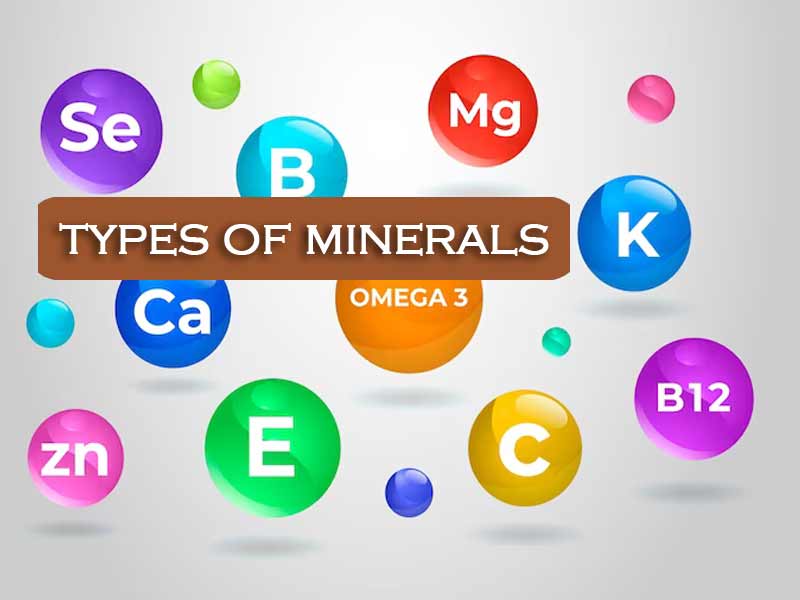Minerals are essential nutrients that play vital roles in many of the body’s functions. These inorganic substances are required in small amounts and are often referred to as micronutrients. Minerals are involved in many physiological processes, including bone formation, nerve function, enzyme activity, and maintaining a healthy immune system.
There are two types of minerals
Macrominerals and Trace minerals. Macrominerals are required in larger quantities, whereas trace minerals are only needed in small amounts.
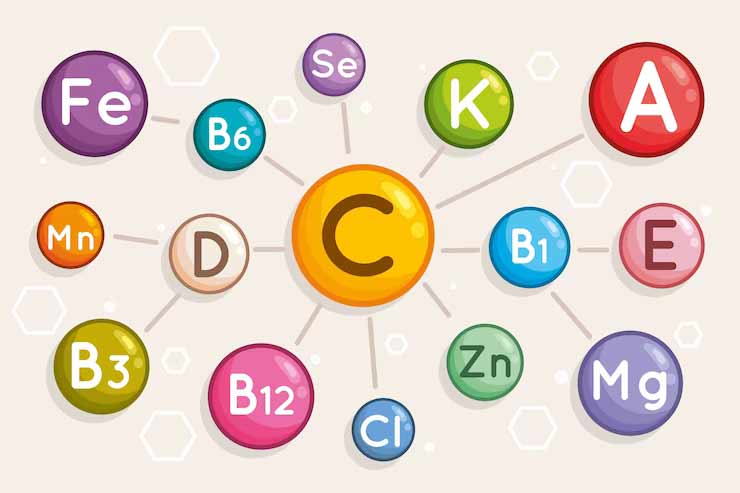
In this article, we will discuss the different types of minerals, their functions, dietary sources, and recommended daily intake.
Macrominerals
Calcium
Calcium is a vital mineral for strong bones and teeth. It also plays a role in muscle contraction, blood clotting, and nerve function. Most of the body’s calcium is stored in the bones and teeth, and the remaining calcium circulates in the blood.
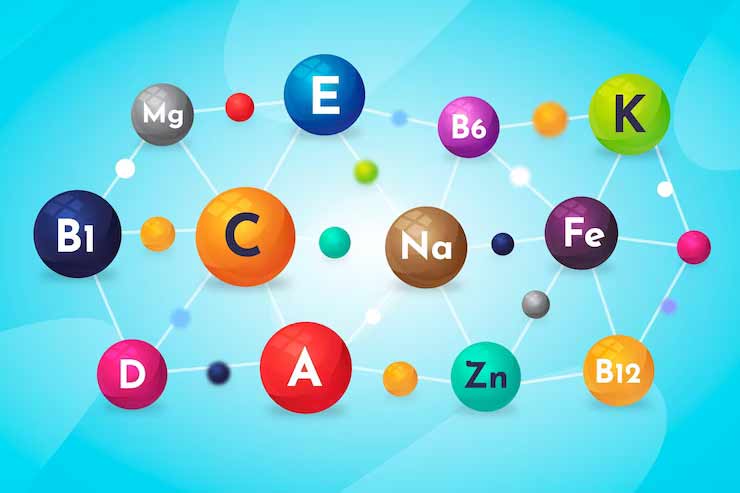
Dietary sources: Milk, cheese, yogurt, fortified plant-based milks, kale, broccoli, sardines.
Recommended daily intake: Adults between the ages of 19 and 50 require 1000mg of calcium daily, and adults over 50 require 1200mg.
Magnesium
Magnesium is required for many biochemical reactions in the body, including muscle and nerve function, protein synthesis, and maintaining a healthy immune system. Magnesium also plays a role in regulating blood sugar levels and blood pressure.
Dietary sources: Nuts, seeds, legumes, leafy green vegetables, whole grains, and dark chocolate.
Recommended daily intake: Adult men require 400-420mg of magnesium daily, and adult women require 310-320mg.
Potassium
Potassium is necessary for muscle and nerve function and helps to maintain a healthy fluid balance in the body. It also plays a role in regulating blood pressure and supporting heart health.

Dietary sources: Bananas, sweet potatoes, beans, avocados, and spinach.
Recommended daily intake: Adults require 2,500-3,000mg of potassium daily.
Sodium
Sodium is essential for regulating fluid balance in the body and is also involved in muscle and nerve function. However, consuming too much sodium can lead to high blood pressure and other health problems.
Dietary sources: Table salt, processed foods, and snack foods.
Recommended daily intake: Adults require no more than 2,300mg of sodium daily.
Phosphorus
Phosphorus is a vital component of DNA and is necessary for bone and teeth formation. It also plays a role in energy metabolism and kidney function.

Dietary sources: Meat, poultry, fish, eggs, dairy products, and whole grains.
Recommended daily intake: Adults require 700mg of phosphorus daily.
Trace Minerals
Iron
Iron is an essential component of hemoglobin, a protein in red blood cells that carries oxygen throughout the body. It is also involved in energy metabolism and immune system function.
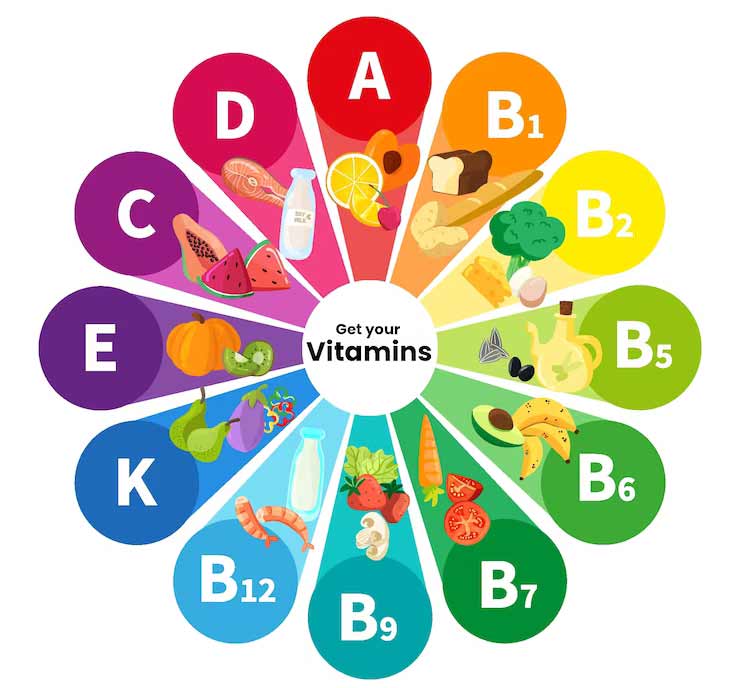
Dietary sources: Red meat, poultry, fish, beans, lentils, tofu, and fortified cereals.
Recommended daily intake: Adult men require 8mg of iron daily, and adult women require 18mg.
Zinc
Zinc is required for wound healing, immune system function, and protein synthesis. It also plays a role in maintaining healthy skin and hair.
Dietary sources: Oysters, beef, chicken, beans, nuts, and whole grains.
Recommended daily intake: Adult men require 11mg of zinc daily, and adult women require 8mg.
Copper
Copper is necessary for the formation of red blood cells and connective tissue. It also plays a role in energy metabolism and immune system function.
Dietary sources: Seafood, nuts, seeds, liver, and dark chocolate.
Recommended daily intake: Adults require 900mcg of copper daily.
Iodine
Iodine is required for the production of thyroid hormones, which are essential for regulating metabolism and brain development. Iodine deficiency can lead to goiter, hypothyroidism, and impaired mental function.
Dietary sources: Seaweed, fish, dairy products, and iodized salt.
Recommended daily intake: Adults require 150mcg of iodine daily.
Selenium
Selenium is necessary for antioxidant defense and immune system function. It also plays a role in thyroid hormone metabolism and DNA synthesis.
Dietary sources: Brazil nuts, fish, poultry, and whole grains.
Recommended daily intake: Adults require 55mcg of selenium daily.
Manganese
Manganese is required for bone formation, wound healing, and carbohydrate metabolism. It also plays a role in antioxidant defense and the production of sex hormones.
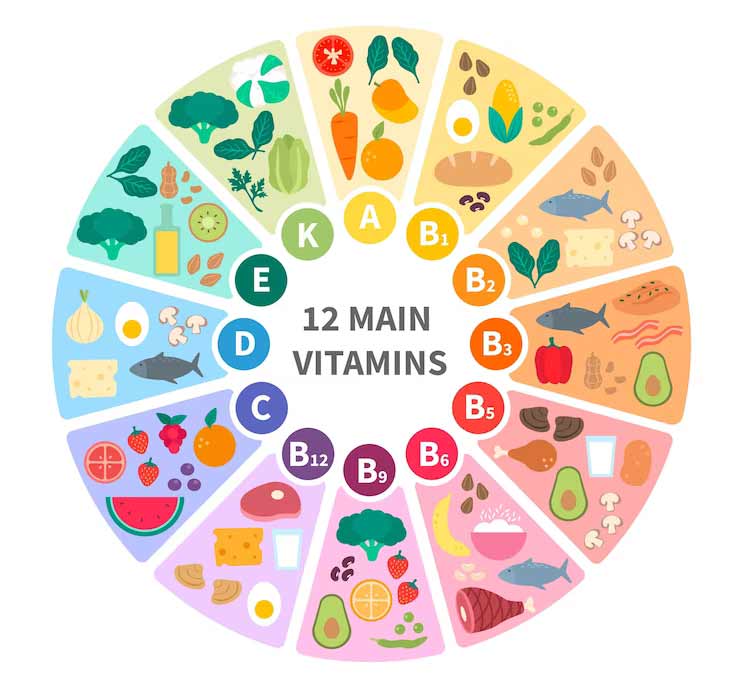
Dietary sources: Whole grains, nuts, legumes, and leafy green vegetables.
Recommended daily intake: Adults require 2.3mg of manganese daily.
Fluoride
Fluoride is necessary for healthy teeth and bones. It helps to prevent tooth decay by strengthening tooth enamel and is often added to public water supplies.
Dietary sources: Fluoridated water, tea, and fish.
Recommended daily intake: Adults require 3-4mg of fluoride daily.
Chromium
Chromium is required for glucose metabolism and insulin action. It also plays a role in regulating cholesterol and triglyceride levels.
Dietary sources: Whole grains, nuts, broccoli, and mushrooms.
Recommended daily intake: Adults require 25-35mcg of chromium daily.
Molybdenum
Molybdenum is necessary for the metabolism of sulfur-containing amino acids and the detoxification of harmful substances. It also plays a role in the production of uric acid.
Dietary sources: Legumes, nuts, and whole grains.
Recommended daily intake: Adults require 45mcg of molybdenum daily.
Benefits of Minerals
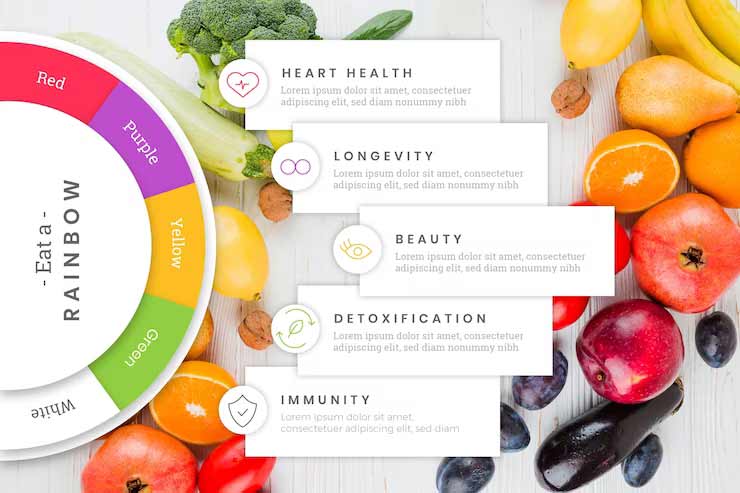
Minerals are essential nutrients that play a vital role in many of the body’s functions. They are necessary for bone formation, nerve function, enzyme activity, and maintaining a healthy immune system. Consuming an adequate amount of minerals through a balanced diet can have many health benefits.
Strong bones and teeth
Calcium, phosphorus, and fluoride are essential minerals for bone and teeth formation. Consuming these minerals through a balanced diet can help to prevent osteoporosis and tooth decay.
Energy metabolism
Many minerals, including iron, magnesium, and chromium, are necessary for energy metabolism. They are involved in the production of ATP, the molecule that provides energy to the body’s cells.
Immune system function
Many minerals, including zinc, selenium, and copper, play a role in maintaining a healthy immune system. They are necessary for the production and function of white blood cells, which protect the body against infection and disease.
Nerve function
Calcium, sodium, and potassium are essential minerals for nerve function. They help to regulate the electrical impulses that allow nerve cells to communicate with each other.
Antioxidant defense
Selenium and manganese are essential minerals for antioxidant defense. They help to protect the body against oxidative stress, which can damage cells and lead to chronic diseases.
Hormone production
Many minerals, including iodine, zinc, and copper, are necessary for the production of hormones. Hormones are chemical messengers that regulate many of the body’s functions, including metabolism, growth, and development.
Dietary Sources of Minerals
Minerals are found in a wide range of foods, including fruits, vegetables, whole grains, nuts, seeds, and animal products.

Consuming a varied and balanced diet is the best way to ensure that you are getting all of the minerals that your body needs. Here are some examples of dietary sources of minerals:
Calcium
Dairy products are the most common dietary source of calcium. Other sources include leafy green vegetables, tofu, almonds, and fortified plant-based milk.
Iron
Animal products, such as red meat, poultry, and fish, are the best dietary sources of heme iron. Non-heme iron is found in plant-based foods, such as leafy green vegetables, beans, and fortified cereals.
Magnesium
Magnesium is found in many plant-based foods, including leafy green vegetables, nuts, seeds, and whole grains. Some animal products, such as dairy products and fish, also contain magnesium.
Zinc
Zinc is found in a variety of animal and plant-based foods. Oysters, beef, and pork are the best sources of zinc, while plant-based sources include beans, nuts, and whole grains.
Copper
Copper is found in a variety of plant-based foods, including legumes, whole grains, nuts, and seeds. Animal products, such as liver and shellfish, are also good sources of copper.
Iodine
Iodized salt is the most common dietary source of iodine. Other sources include seaweed, dairy products, and fish.
Selenium
Selenium is found in a variety of animal and plant-based foods. Brazil nuts are the richest dietary source of selenium, while other sources include fish, poultry, and whole grains.
Manganese
Manganese is found in a variety of plant-based foods, including whole grains, nuts, and legumes. Leafy green vegetables are also a good source of manganese.
Fluoride
Fluoridated water is the most common dietary source of fluoride. Other sources include tea and fish.
Chromium
Chromium is found in a variety of plant-based foods, including whole grains, nuts, and broccoli. Some animal products, such as liver and poultry, also contain chromium.
Molybdenum
Molybdenum is found in a variety of plant-based foods, including legumes and whole grains.
Dietary Supplements
While it is generally best to get your nutrients from a balanced diet, some people may benefit from taking mineral supplements. For example, pregnant women may need to take iron supplements to prevent anemia, and people with certain medical conditions may require supplements to correct deficiencies.

If you are considering taking a mineral supplement, it is important to speak with a healthcare professional first. Some mineral supplements can interact with medications or cause adverse effects, particularly if taken in excessive amounts.
Conclusion
Minerals are essential nutrients that play a vital role in many of the body’s functions. Consuming an adequate amount of minerals through a balanced diet can have many health benefits, including strong bones and teeth, energy metabolism, immune system function, nerve function, antioxidant defense, and hormone production.
While it is generally best to get your minerals from a balanced diet, some people may benefit from taking supplements. If you are considering taking a mineral supplement, it is important to speak with a healthcare professional first to ensure that it is safe and appropriate for you.
By consuming a varied and balanced diet that includes a range of fruits, vegetables, whole grains, nuts, seeds, and animal products, you can ensure that you are getting all of the minerals that your body needs to function at its best.
The last word is with you, the audience
Be sure to read other educational articles. For scientific issues, be sure to contact a specialist doctor. These materials are only for study and non-educational purposes. Of course, expert doctors can guide you a lot.
Our cooking training center has collected unique materials for you dear ones. This content is very useful and will help you cook the best and most delicious food for yourself and your loved ones at home.
The recipe section is for introducing the best dishes of the nations. Dear ones, you can see the best dishes in this section and cook whatever you want at home. Don’t forget to read the recipe and ingredients before doing anything to determine your cooking needs.
Soon we will be with you with a more professional team with more facilities. We suggest that if you are overweight, fill out the and wait for our experts to contact you and send you the right meal plan.
The slogan we put on our site is to fight obesity. In this regard, we will provide you with many suitable recipes. Be sure to follow our site to learn about many healthy foods. Do not forget that a healthy life requires extensive changes. One of these changes is changing food. So eat healthy
Please follow us on linkedin. You can learn all best french food recipe and best Italian food recipe and best arabic food recipes and best Iranian food recipes you can check our Reddit page.
